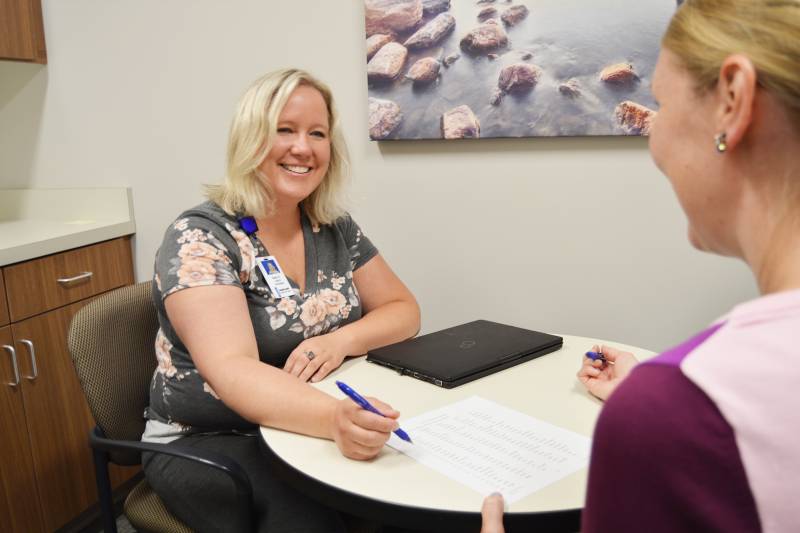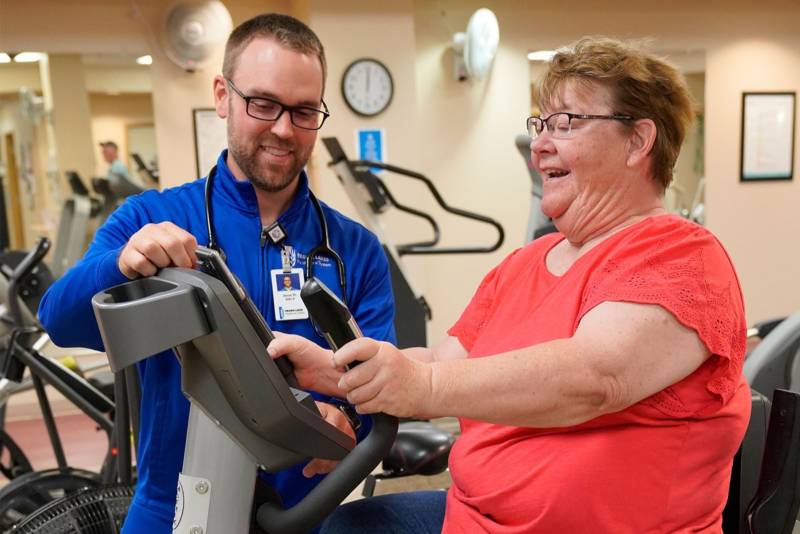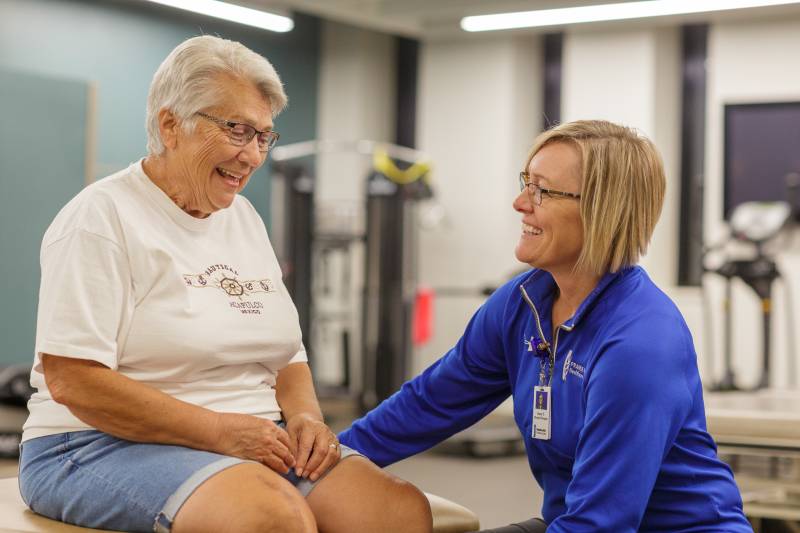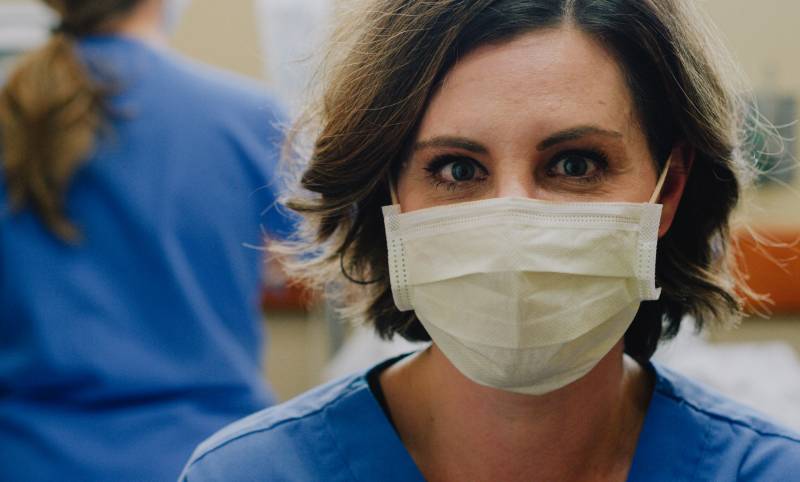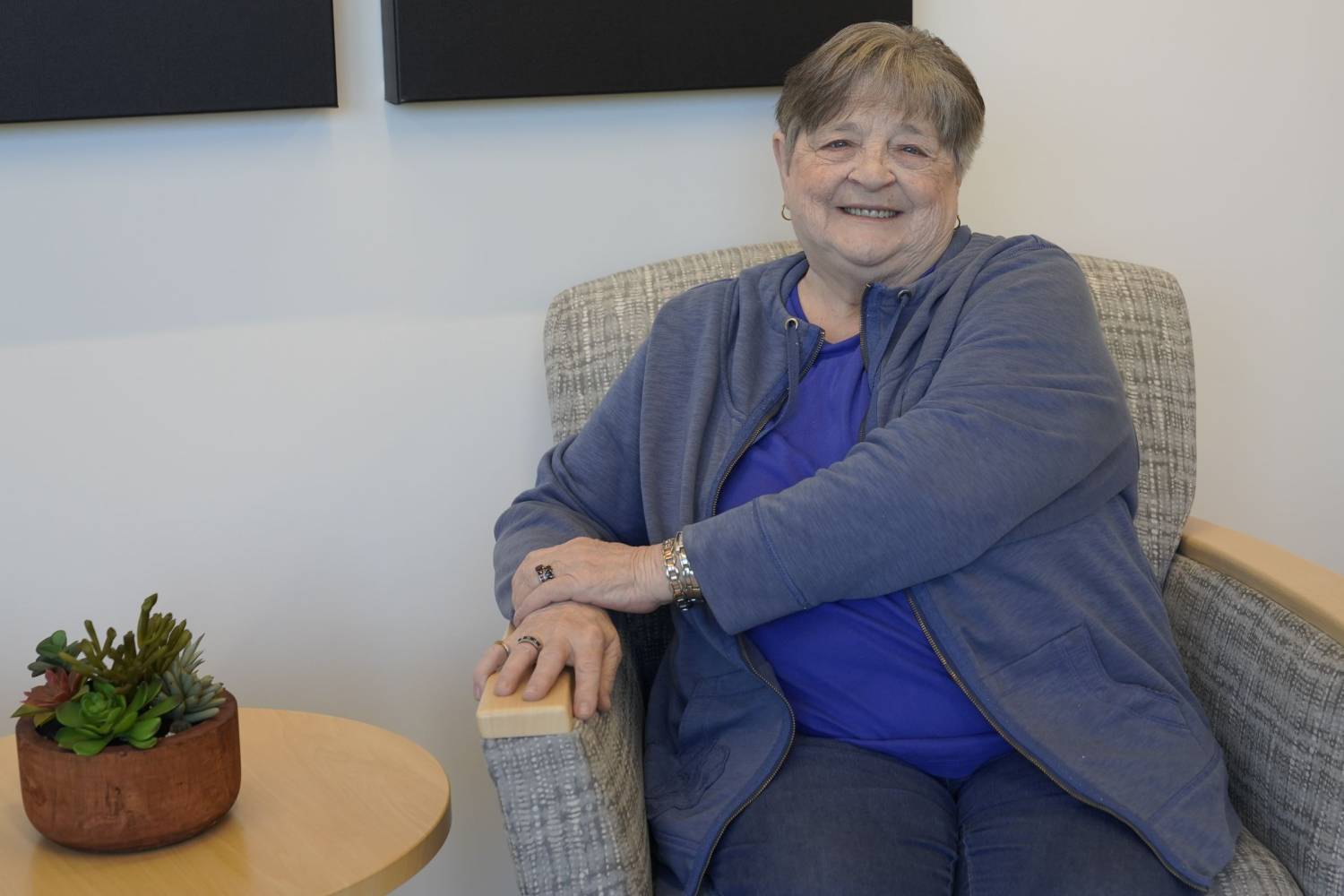Jack Hughes
Monday, February 25, 2013
Giving a gift through estate planning
The most practical way to make significant gifts may be through your estate plan, by means of a will, living trust or a beneficiary designation on a life insurance policy or retirement account. Such gifts are wholly revocable while you are alive and may save significant taxes for your estate.
Wills and Living Trusts
A bequest is the most traditional way to provide significant help for worthwhile causes. With a gift through your will or living trust, you are able to keep full use of your gift assets during your life.
You can structure a bequest in ways that will be both personally satisfying and tax advantageous. Charitable bequests take many forms:
- Outright (specific) bequest: This is a gift of a particular amount of money or item of property (for example: "I bequeath $25,000.").
- Residuary bequest: The residue of an estate is the amount remaining after all specific bequests have been distributed; the exact amount will not be known until the final accounting is completed. The residue may pass as a percentage bequest (e.g., "I give one-third of the residue of my estate.").
- Contingent bequest: You can name a secondary beneficiary to receive property in the event the primary beneficiary is not alive (for example: "I bequeath $10,000 to my father, but if he has predeceased me, I direct the $10,000 be paid to...")
Financial Accounts
Most accounts at financial institutions can be made payable on death to a person or a charitable organization. Ask the manager of the institution how you can arrange to designate a death beneficiary for your CD, savings account, share accounts, etc. In some areas, this is accomplished through a "P.O.D." (payable on death) designation. Securities in a brokerage account can be left through a "T.O.D." (transfer on death) designation.
Retirement Accounts
Your estate can save both income taxes and estate taxes if you make a charitable organization beneficiary of part or all of your IRA or other retirement account. Family members might keep only 30 cents on the dollar, after taxes, from these assets. Changes in IRS regulations have made it simpler and more favorable to name worthwhile causes as beneficiaries of IRAs and other retirement accounts.
Life Insurance
You can name Prairie Lakes Healthcare Foundation as the beneficiary of a life insurance policy (or a percentage of the proceeds); just contact the company for appropriate forms. A better idea may be to transfer actual ownership of the policy to us (assuming it is a "surplus" policy that is no longer needed for family security). Your gift will entitle you to an income tax deduction, and any future premium payments will be tax deductible.
Residences and Farms
Friends who own personal residences, including condos and vacation homes, can make gifts of their property but continue to use the property for the rest of their lives. The same opportunities are available with farms and ranches. The advantage of a lifetime gift, reserving lifetime use, is that you receive an income tax charitable deduction, in addition to estate tax savings.
Let Us 'Borrow' Investment Assets Temporarily with a Charitable Lead Trust
To continue the agricultural comparison, you can "keep the tree but give the fruit." It's possible to contribute merely the income from securities or other property temporarily and enjoy substantial income tax or gift and estate tax benefits. This technique is called the "charitable lead trust." Alternatively, you can lend cash (up to $250,000) and remove the annual interest from your tax bracket.
This technique can be especially helpful to friends who need large charitable deductions in a year of exceptionally high income, or face heavy federal estate taxes.
For more information contact our Foundation office at 605.882.7631 or send an email to This email address is being protected from spambots. You need JavaScript enabled to view it..
Published in
Our Foundation
Tagged under
Monday, February 25, 2013
About the Foundation
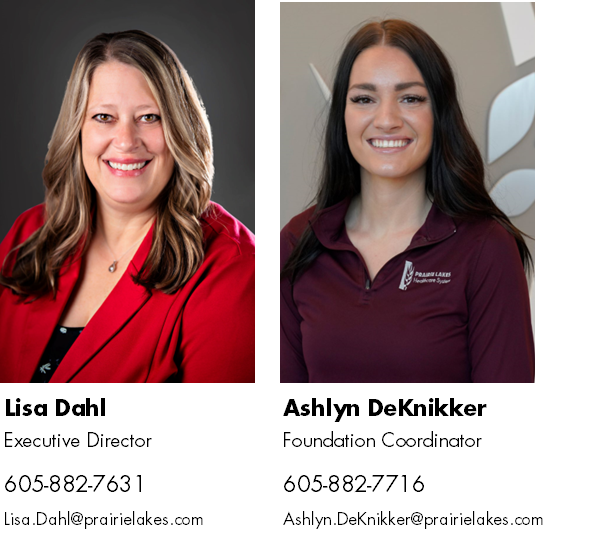
Fall 2024 Letter from Lisa Dahl, Executive Director:
Welcome to the Prairie Lakes Healthcare Foundation’s website. My name is Lisa Dahl, and I am the Executive Director of the Prairie Lakes Healthcare Foundation. I’m thrilled you are interested in learning more about our mission and how we impact the Prairie Lakes Healthcare System.
Our mission is that “Healthcare is a vital component of a community's quality of life. Prairie Lakes Healthcare Foundation exists to raise funds with which to support and advance the health services available to the Watertown area through Prairie Lakes Healthcare System.”
Prairie Lakes Healthcare System is evolving as an integrated regional health system, being a trusted partner in health and healthcare. Prairie Lakes Healthcare System’s mission is to be the Keystone of the Community, Providing Exceptional Care Every Day.
To achieve this, we need your help. Prairie Lakes Healthcare System is focused on growing primary care, and medical specialty services, and collaborating with partners to make this possible. This growth allows Prairie Lakes to reinvest in our community and to continue providing high-quality care to those we care for. It also positively impacts approximately 800 team members who work to provide this exceptional care.
The Prairie Lakes Healthcare Foundation is dedicated to supporting this goal, and we need your help.
I would be delighted to talk with you about how we can work together to ensure the success of our mission. Your financial support is crucial as we navigate through these challenging and exciting times, as we strive to build a healthier future for all.
Warm regards,
Lisa Dahl
Executive Director
Prairie Lakes Healthcare Foundation
Our Mission
Healthcare is a vital component of a community's quality of life. Prairie Lakes Healthcare Foundation exists to raise funds with which to support and advance the health services available to the Watertown area through Prairie Lakes Healthcare System.
Prairie Lakes Healthcare System is committed to providing high quality, compassionate, and affordable healthcare services for people in the region. The Prairie Lakes Healthcare Foundation works to support and advance this mission.
Please consider joining the Foundation in its efforts to help more patients, expand facilities, acquire cutting-edge equipment, and attract top medical professionals. Your contribution remains in our community to benefit you and your family, friends, and neighbors. All donations are tax deductible to the fullest extent of the law.
Prairie Lakes Healthcare Foundation
Phone: 605-882-7631
Email: This email address is being protected from spambots. You need JavaScript enabled to view it.
401 9th Avenue NW
Watertown, SD 57201
Published in
Our Foundation
Tagged under
Monday, February 25, 2013
Prairie Lakes Healthcare Foundation
Current Fundraising Campaigns
Save the dates for BASH 2025 (May 3, 2025), Yellow Rose Week (June 2 - 6, 2025), and Hospital Hill Run (June 7, 2025).
Our Mission
Healthcare is a vital component of a community's quality of life. Prairie Lakes Healthcare Foundation exists to raise funds with which to support and advance the health services available to the Watertown area through Prairie Lakes Healthcare System.
Prairie Lakes Healthcare System is committed to providing high quality, compassionate, and affordable healthcare services for people in the region. The Prairie Lakes Healthcare Foundation works to support and advance this mission.
Please consider joining the Foundation in its efforts to help more patients, expand facilities, acquire cutting-edge equipment, and attract top medical professionals. Your contribution remains in our community to benefit you and your family, friends, and neighbors. All donations are tax deductible to the fullest extent of the law.
Our Causes | Campaigns and Events | Board of Directors l Become a Volunteer
Published in
Our Foundation
Tagged under
Friday, February 22, 2013
Speech Therapy
Speech therapy treats disorders that affect speech, cognition, and swallowing. Potential medical conditions that a speech language pathologist can treat:
- Stroke
- Head injury
- Encephalitis
- Meningitis
- Head and neck cancer
- Brain tumor
- Degenerative diseases such as Parkinson's, amyotrophic lateral sclerosis and multiple sclerosis
- Tracheotomy
- Dsyphagia
- Vocal cord impairment
- Aspiration pneumonia
Here are some questions you can ask about your loved one. If the answer is yes to any of these, you might want to talk to their physician about a referral to a speech language pathologist.
- Does the person have frequent coughing or choking during or after eating?
- Does the person have a wet or gurgle voice after eating?
- Does the person become frustrated with communication attempts?
- Do you have trouble understanding the person's speech?
- Do you have to encourage the person to use gestures, pointing, head nods to determine their wants and needs?
- Does the person's voice quality make his/her speech difficult to understand OR make is difficult to listen to what is said?
- Do you have to remind the person of his/her daily schedule of medication needs frequently?
- Is the person distractible or impulsive?
- Do you need to help the person read a menu or written instructions?
- Do you have to repeat or rephrase instructions or information frequently?
- Do you have to give the person more time to respond than usual?
- Does the person have difficulty managing a home or maintaining a job or business due to difficulty communicating or managing information?
For more information, please call Prairie Lakes Rehabilitation Services at 605-882-7700.
Articles:
Published in
Speech Therapy
Tagged under
Friday, February 22, 2013
Pulmonary Rehab
Chronic obstructive pulmonary diseases (COPD) such as emphysema, chronic bronchitis, asthma and cystic fibrosis affect nearly 2 million Americans. However, with preventive and rehabilitative care, patients can reduce the need for hospitalization and experience a better quality of life. A personalized program of education and exercise, with changes in diet and smoking habits, can help you return to a higher degree of physiological and psychological function.
What we can do for you
Our team at Prairie Lakes Healthcare System's Pulmonary Rehabilitation Department give you and your family the information and support you need to meet the day-to-day challenges of living with a chronic lung disorder. We provide individualized care through multidisciplinary teams that include respiratory therapists, physical and occupational therapists, dietitians, social workers and other healthcare professionals.
- Supervised exercise training
- Instruction on the use of respiratory medications and devices such as nebulizers and inhalers
- Smoking cessation
- Nutritional counseling
- Oxygen therapy
- Breathing retraining
- Energy conservation tips
- Living with a chronic disease
Continuing help
When you complete our pulmonary rehabilitation program, Prairie Lakes Healthcare System also offers Phase III and IV programs. These supervised exercise maintenance programs, let people with pulmonary disease to maintain exercise levels reached in the initial pulmonary program.
Goals of the maintenance program are to:
- Control and lessen the symptoms and complications of pulmonary disease.
- Teach you how to improve physical capabilities and achieve an optimal level of independence.
- Reduce frequent recurrent hospitalizations.
For more information, call our Pulmonary Rehabilitation Department at (605) 882-7850.
Published in
Pulmonology
Tagged under
Friday, February 22, 2013
Physical Therapy
Physical Therapy focuses on the development of gross motor skills, functional mobility, strength and balance. There is a broad range of physical therapies available that help people recover and gain strength in areas such as:
- Preparing for total joint replacement surgery
- Recovering from surgery
- Overuse injuries from work or hobbies
- Stability and balance
- Sports training
- Vertigo and dizziness
- Urinary incontinence and women’s health
- Child development
Our Physical Therapists are specialized to help patients using the following techniques and therapies:
- Aquatic therapy
- Graston technique for Myofascial Release
- Cognitive pain treatment
- Vestibular therapy
- Athletic training
- Therapeutic exercise
- Lymphedema therapy
Learn more about our more common specialized areas of Physical Therapy:
To schedule an appointment please call Prairie Lakes Rehabilitation Services at 605-882-7700.
Published in
Physical Therapy
Tagged under
Friday, February 22, 2013
Occupational Therapy
Occupational therapy helps individuals of all ages regain the ability to return to an active lifestyle following injury, illness or surgery. Highly trained occupational therapists develop personalized treatment plans to help increase strength, endurance, flexibility and independence.
Our occupational therapy team is specialized to help patients using the following techniques and therapies:
- Upper extremity rehabilitation
- Hand therapy
- Custom splinting
- Neurological rehab
- Edema control
- Lymphedema management
- Return to work
- Total joint rehab
- Cognitive retraining
- Geriatric rehab
- Graston technique for myofascial release
- Injury prevention
- Home health
To schedule an appointment please call Prairie Lakes Rehabilitation Services at 605-882-7700.
Published in
Occupational Therapy
Tagged under
Friday, February 22, 2013
Incontinence Rehabilitation Therapy
Prairie Lakes Healthcare System recognizes the need to address a common problem many people live with on a daily basis: incontinence. Specially trained therapists in the Prairie Lakes Rehabilitation Services department offer an Incontinence Rehabilitation Therapy Program for men, women and children who suffer from urinary or fecal incontinence.
What is incontinence?
Incontinence means the involuntary loss of bladder control or bowel control. This is a common problem experienced by as many as 20 million males and females of all ages. It often seems difficult to manage and many believe that nothing can be done to correct it. Incontinence can lead to frustration, isolation, and depression.
The elderly often find themselves placed in nursing homes when family members are no longer able to cope with the problems created by incontinence. Other adults may find themselves homebound because incontinence has interfered with daily activities such as travel and work. In children, this problem often causes undue embarrassment and low self-esteem when the incontinence occurs at school or at play.
Types and Causes of Incontinence
Stress Incontinence – when a small amount of urine is released by everyday physical activities such as laughing, coughing, and sneezing that place an increased amount of pressure on the bladder. Causes may include pregnancy and childbirth, injury or trauma, surgery in the vagina or rectum, episiotomy or lack of exercise or use.
Urge Incontinence – when the urge to urinate comes on so suddenly that it is often impossible to reach the bathroom in time.
Functional Incontinence – urine loss that occurs when a person cannot get to the bathroom in time. Can be caused by joint or muscle weakness, problems with mobility, confusion, dementia or delirium, environmental barriers (bathroom too far away), or psychological problems.
Fecal Incontinence – when impaired rectal sensation or muscle control results in the loss of stool or the staining of underclothes.
Help is Available
Incontinence is not a hopeless condition. In and of itself, incontinence is not a disease, but rather a symptom of an underlying condition that affects men, women, and children. Embarrassment, shame, and a mistaken sense of futility about management of the problem, can prevent people from seeking help.
At the Prairie Lakes Rehabilitation Department, therapists are trained to help people overcome incontinence by offering a non-surgical approach to treating incontinence. They advocate a self-help program of exercise and surface EMG, which has proven effective in helping many patients regain bladder and/or bowel control.
These exercises are essential in strengthening the muscles that support the internal organs and control the sphincter muscles. The pelvic floor muscles also assist in strengthening the back and core, stabilize the pelvis and assist in sexual function. When weakened or stretched, the muscles can cause or contribute to the problem of incontinence. The exercises patients are taught are simple to do but they play a major role in helping overcome incontinence.
What is involved in the rehabilitation?
Using a computerized biofeedback device that assesses pelvic floor muscle activity, patients are shown how to do proper pelvic diaphragm exercises. The device provides a visual aid in understanding how to do the exercises correctly. The treatment may include keeping toileting diaries and strategies to re-training the bladder. Patients will be educated on diet and nutrition in order to avoid foods and drinks that may irritate the bladder. The home program may also include exercises to stretch and strengthen hip and core muscles. Electrical stimulation may also be used to improve awareness and aid in strengthening the pelvic floor muscles.
For more information about the Incontinence Rehabilitation Program, contact your doctor, or Prairie Lakes Rehabilitation Services at 605-882-7700.
Published in
Physical Therapy
Tagged under
Friday, February 22, 2013
Same Day Surgery
Same-day surgery at a Prairie Lakes Healthcare System facility is a safe, convenient, high quality and economical option for a wide range of medical procedures. You can have your surgery, safely recover and then return home -- where healing is best. You can sleep in your own bed that night.
Same-day surgical procedures take place at two facilities in Watertown: Prairie Lakes Hospital's Same-Day Services Department or Prairie Lakes Mallard Pointe Surgical Center.
Prairie Lakes Same-Day Services
The professional healthcare providers at Prairie Lakes Hospital perform outpatient surgery and other medical procedures in the safety of a full-service hospital environment. Our skilled healthcare team is experienced in providing a full-range of same-day surgical and diagnostic procedures in orthopedics, ophthalmology, urology, gynecology, pediatrics, endoscopy, laparoscopy, ear/nose/throat, and general surgery.
Mallard Pointe Surgical Center
The experienced surgical team at Prairie Lakes Mallard Pointe Surgical Center offer patients high-quality, compassionate surgical services in a number of areas.
Learn more about Mallard Pointe
Same-day surgical procedures are reimbursable by most insurance companies. Check with your insurance representative for details about your coverage and to see if pre-certification is necessary.
Published in
Surgical Services
Tagged under
Friday, February 22, 2013
Preparing For Your Surgery
Any surgical procedure can be intimidating. Support staff at Prairie Lakes can help you plan for your upcoming appointment, understand your insurance coverage as it relates to your surgery, and discuss with you the next steps following your surgery.
Being informed about the process before your procedure is not only necessary but will help you feel at ease. Your doctor and our staff are here for you every step of the way.
Before Your Surgery
Be Informed
Ask your surgeon about the planned procedure, risks, benefits, and alternative treatments. Details and informative videos from our staff are provided to take much of the uncertainty out of the surgical process. Click to watch the videos.
Gather Needed Information & Necessities
- List all of your medications that are prescribed and purchased over-the-counter, including supplements and eye drops. Doing this several days before your procedure may assist with the pre-op call with the nurse. We recommend keeping this list with you to reference when the nurse calls.
- Day Before
- Medications in their original bottles.
- Medicare, Medicaid, and/or Insurance ID card.
- Photo Identification.
- If you wear contact lenses or glasses, bring a case for their safekeeping.
- Choose which loose, comfortable clothing to wear the day of your procedure.
- If you will be staying in the hospital after your procedure, pack a bag with the needed items.
Expect Several Pre-Op Calls
A surgery nurse will call a few days before surgery to confirm your procedure. The nurse will obtain your medical history, current medications and review other instructions specific to your procedure. Your arrival time will be called to you the day before your surgery. Please call by 2 p.m. the day before surgery if a nurse hasn't contacted you by this time. If your procedure is at the hospital call Central Scheduling at (605) 882-7690; if it is at Mallard Pointe Surgery Center call (605) 882-4743. Any lab tests may be done up to 7 days before surgery.
Arrange for Care & Transportation
You must not drive home after your procedure and must be accompanied by a responsible adult if you receive sedation or anesthesia. Most patients should have an adult with them for 24hours after surgery.
Day of Your Procedure: General Instructions
Medications
Take your medications as instructed by your surgeon or the nurse. Usually prescribed medications for heart, blood pressure, breathing, seizures and pain can be taken with a sip of water the morning of surgery. Make sure you understand the instructions the surgery nurse gives you. Bring your medications in their original bottles with you.
Eating & Drinking
These instructions are very important for your safety and if not followed, your surgery may be canceled.
- Remember the time the nurse tells you to stop eating and drinking before your surgery.
- You may not chew gum, smoke, eat mints or suck hard candy during this time of fast.
- You may brush your teeth, but do not swallow water.
You may be instructed that you can have clear liquids, which are these and no others:
- Clear broth, black coffee, or tea
- Soda, water, Gatorade
- Pulp free juice-only apple, cranberry, or grape
- Jello, popsicles
Do not take clear liquids unless your nurse tells you it is OK to do so.
For Your Safety
- Please remove all jewelry, including facial, tongue, or body piercings, and leave them at home.
- Do not shave the surgery area 48 hours prior to surgery.
- Follow instructions for pre-op showers and wear freshly laundered comfortable clothing.
- Please do not wear make-up or nail polish and plan to remove contact lenses before surgery.
Surgery Admitting Offices
Prairie Lakes Hospital is located at 401 9th Ave NW in Watertown SD. The hospital admitting office is located inside the Emergency Entrance off of 10thAve NW.
Prairie Lakes Mallard Pointe Surgical Center is located at 1201 Mickelson Dr in Watertown SD. Patients presenting for same-day procedures enter through the south (upstairs) door.
Published in
What to Expect
Tagged under
We See You living your life
And we're here for you with the latest technology and medical expertise you need to live your best life possible.
Orthopedics
Glacial Lakes Orthopedics is now Prairie Lakes Orthopedics.
Join Our Team
Over 600 staff members and 200 volunteers make our regional healthcare system one of the top rural health systems.
Available Services
Prairie Lakes Healthcare System offers a wide range of medical services for people who call northeastern South Dakota and western Minnesota home.
Surgical Services
Our team is here for urgent procedures like appendix removal and scheduled surgeries like joint replacement.
Dermatology
Feel good about your skin’s health. Our specialists offer individualized treatment plans and cosmetic options.
We can help you find a doctor. Call 605-882-7000 or search online.

